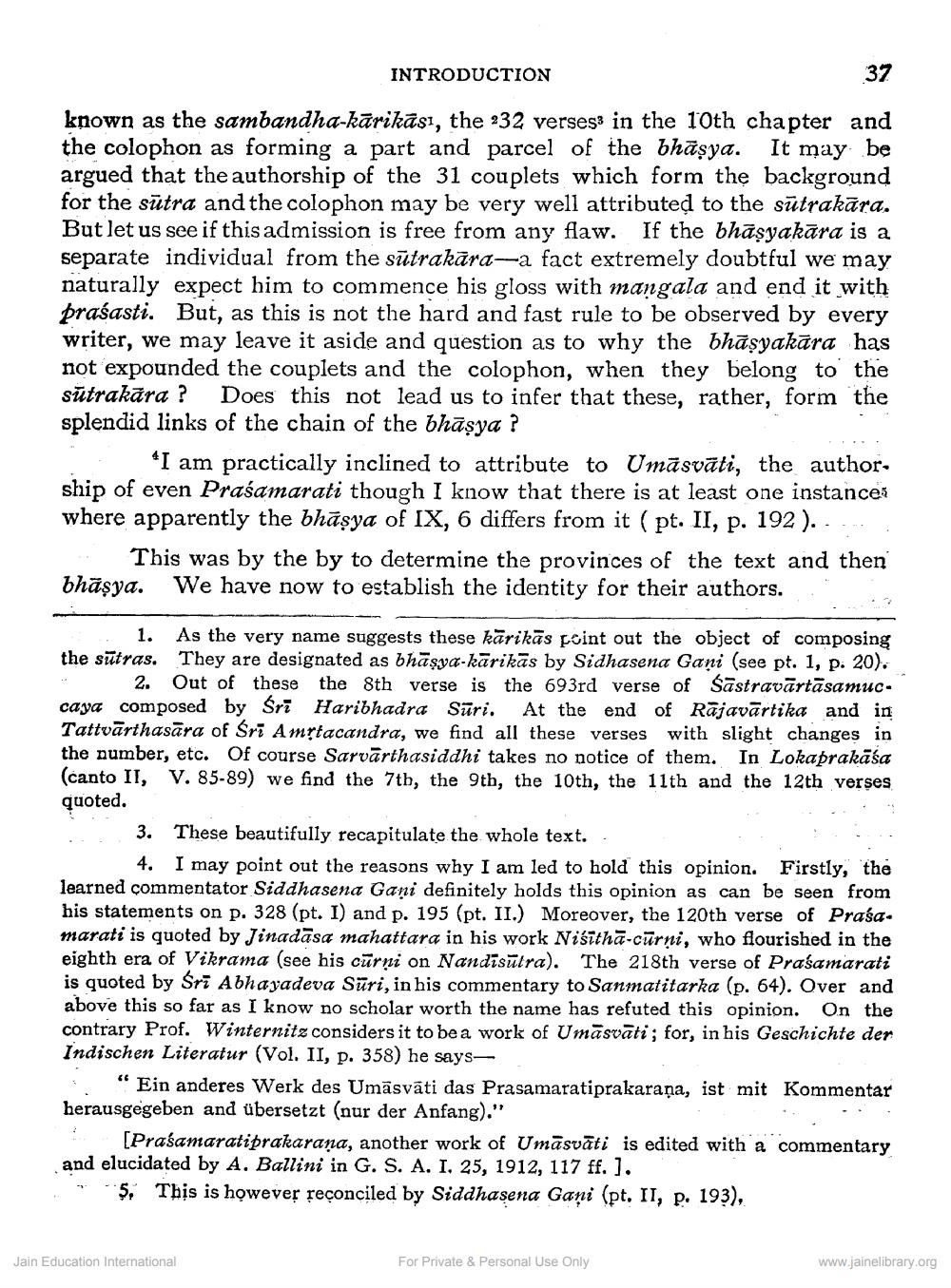________________
INTRODUCTION
37
known as the sambandha-kārikās1, the 32 verses in the 10th chapter and the colophon as forming a part and parcel of the bhasya. It may be argued that the authorship of the 31 couplets which form the background for the sutra and the colophon may be very well attributed to the sutrakāra. But let us see if this admission is free from any flaw. If the bhasyakara is a separate individual from the sutrakāra-a fact extremely doubtful we may naturally expect him to commence his gloss with mangala and end it with prasasti. But, as this is not the hard and fast rule to be observed by every writer, we may leave it aside and question as to why the bhāṣyakāra has not expounded the couplets and the colophon, when they belong to the sūtrakāra ? Does this not lead us to infer that these, rather, form the splendid links of the chain of the bhasya?
"I am practically inclined to attribute to Umasväli, the author. ship of even Prasamarati though I know that there is at least one instances where apparently the bhasya of IX, 6 differs from it (pt. II, p. 192). .
This was by the by to determine the provinces of the text and then bhāṣya. We have now to establish the identity for their authors.
1. As the very name suggests these karikas point out the object of composing the sutras. They are designated as bhasya-kärikäs by Sidhasena Gani (see pt. 1, p. 20). 2. Out of these the 8th verse is the 693rd verse of Sastravārtāsamuccaya composed by Sri Haribhadra Suri. At the end of Rajavartika and in Tattvarthasara of Sri Amṛtacandra, we find all these verses with slight changes in the number, etc. Of course Sarvarthasiddhi takes no notice of them. In Lokaprakāśa (canto II, V. 85-89) we find the 7th, the 9th, the 10th, the 11th and the 12th verses quoted.
3. These beautifully recapitulate the whole text.
4. I may point out the reasons why I am led to hold this opinion. Firstly, the learned commentator Siddhasena Gani definitely holds this opinion as can be seen from his statements on p. 328 (pt. 1) and p. 195 (pt. II.) Moreover, the 120th verse of Praba marati is quoted by Jinadasa mahattara in his work Nikitha-curni, who flourished in the eighth era of Vikrama (see his curgi on Nandisutra). The 218th verse of Prabamarati is quoted by Sri Abhayadeva Suri, in his commentary to Sanmatitarka (p. 64). Over and above this so far as I know no scholar worth the name has refuted this opinion. On the contrary Prof. Winternitz considers it to be a work of Umasvati; for, in his Geschichte der Indischen Literatur (Vol. II, p. 358) he says
"Ein anderes Werk des Umäsväti das Prasamaratiprakarapa, ist mit Kommentar herausgegeben and übersetzt (nur der Anfang)."
[Prasamaratiprakaraṇa, another work of Umasvati is edited with a commentary and elucidated by A. Ballini in G. S. A. I. 25, 1912, 117 ff. ].
5. This is however reconciled by Siddhaṣena Gayi (pt. II, p. 193),
Jain Education International
For Private & Personal Use Only
www.jainelibrary.org




